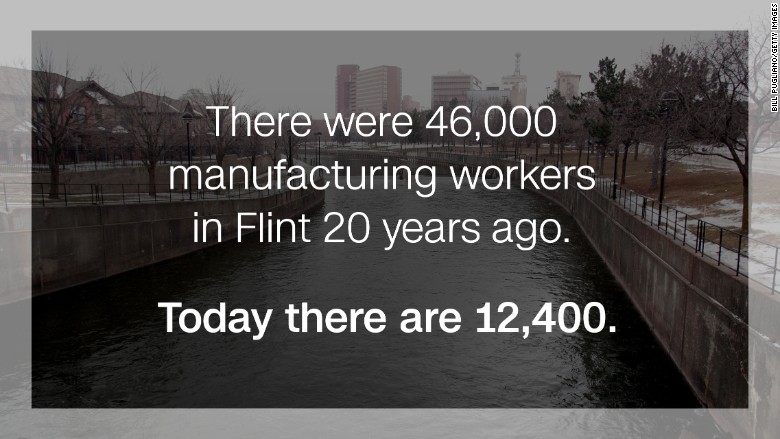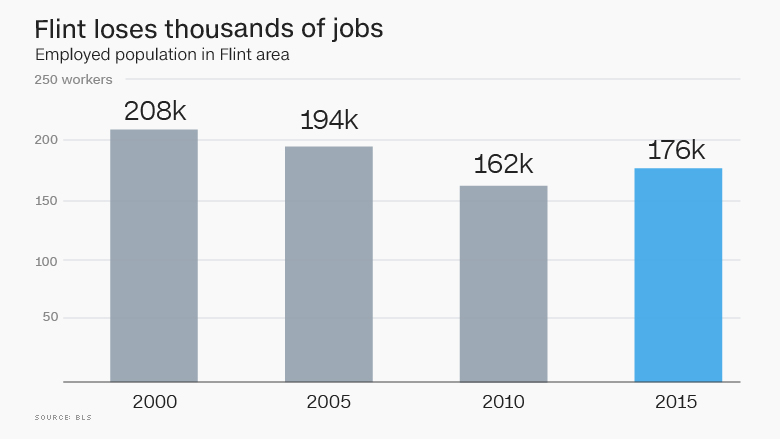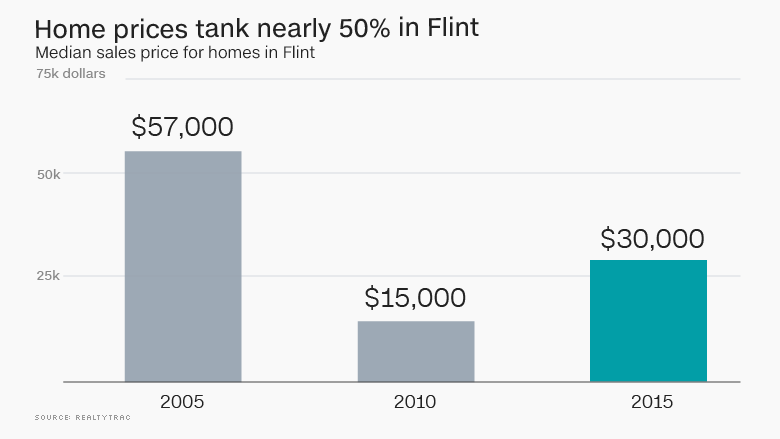
Before the water became toxic, Flint lost jobs, wages and its economic engine -- cars.
Democratic presidential candidates Hillary Clinton and Bernie Sanders took part in the CNN debate Sunday night in Flint where a toxic water crisis has sparked another debate about negligent lawmakers.
"Flint reflected wide scale failures of governance in communities," says U.S. Secretary of Labor Tom Perez.
Related: Ways you can help Flint residents
Beyond its water crisis, Flint's economy is a sobering reminder of how hard America's rust belt -- roughly Pennsylvania to Wisconsin -- has been hurt over the decades. Jobs have been shipped overseas, and the Great Recession followed by a slow economic recovery have only made matters worse.

"In the 1950s, Flint was a very affluent place," says Charles Ballard, an economics professor at Michigan State University. "(Now) the city of Flint is depressed."
Flint's downturn isn't new. Documentary maker Michael Moore put Flint's problems on the map with his widely acclaimed 1989 film, "Roger & Me" about General Motors (GM) in Flint.
Like the rest of America, Flint has rebounded from the depths of the recession. However, over the long term, its economy looks like a hollow frame of its former self.
Here's how the economy looks in the greater Flint area.
1. Jobs in Flint vanish
Flint has an enviable unemployment rate of 4.6%, the same level as it was in June 2000.
The difference: There's only about 176,000 people going to work in the Flint area today, or 32,000 fewer than in 2000.
That's because Flint has lost 15% of its working population in the last 15 years.

2. Paychecks shrink in Flint
Flint workers are making $25 an hour on average, slightly lower than what they were making at the start of the recession. Much of America has seen little, if any, wage growth and Flint epitomizes that trend.
But in Flint, wages have actually gotten worse in recent months. In August, the average worker there was making $26.10 an hour, according to the St. Louis Federal Reserve. Wages are down 4% in Flint in just six months.
3. Home values have fallen
Home prices here have rebounded from recession level lows like they have in the rest of the country. However, Flint hurts more.
Last year, the median sale price for a home in Flint was $30,000, down nearly 50% from $57,000 in 2005. Home prices at the height of the Great Recession fell as low as $13,500 in 2009, according to research firm RealtyTrac.

4. Auto boomtown goes bust
After World War II, Flint remained an auto industry powerhouse along with much of the state. General Motors had a big plant there and auto assembly lines drove the area's growth, experts say.
But in recent decades, Flint's manufacturing sector has been gutted. Consider this: 20 years ago, there were 46,000 manufacturing workers in Flint, mostly driven by its once booming auto industry.
Today there are a mere 12,400 workers in manufacturing in Flint.
"The loss of auto industry employment -- that's a big Michigan story, but nowhere is it bigger than in Flint," says Ballard. Looking forward: "The challenges are profound."
-- Kathryn Vasel contributed to this report.


